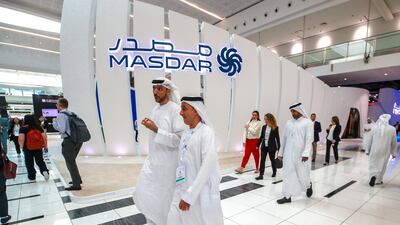Abu Dhabi’s clean energy company Masdar plans to raise money through the issuance of a green bond this year, the company's chief executive has said.
“This will allow international investors to join Masdar's green energy journey,” Mohamed Al Ramahi said at the Abu Dhabi Sustainable Finance Forum on Thursday.
“We have the tools to meet our climate objectives … we believe we have the capital [and] we have the solution, but it will take all of us working together to succeed,” said Mr Al Ramahi.
The size of the planned bond was not disclosed.
The issuance of green bonds in the Middle East region grew by 38 per cent between 2016 and 2020, and in 2020 alone, Middle Eastern governments drove 97 per cent of green bond issuances, compared with 13 per cent four years earlier, according to the Boston Consulting Group.
“In these early stages of the climate transition, there is a critical need for patient, high-risk capital for investments in sectors whose paths to decarbonisation are dependent on technologies that are still in the early stages of development, such as iron and steel, heavy road transport and shipping,” the consultancy said in a report this month.
The UAE has already committed $163 billion to reach net zero by 2050 while Saudi Arabia has pledged about $180 billion to meet its target by 2060.
Masdar will publish its first green finance framework “in the coming weeks”, Mr Al Ramahi said.
Last month, the company announced its new shareholding structure as part of a deal with the Abu Dhabi National Energy Company, better known as Taqa, Mubadala Investment Company and Adnoc, along with the creation of a green hydrogen business unit.
As part of the deal, Masdar is looking to aggressively expand and has set a renewable energy portfolio capacity target of at least 100 gigawatts by 2030, with the lion's share coming from wind and solar technology.
Global investment of "$5.7 trillion per year is required until 2030 to meet our [climate] commitments”, Mr Al Ramahi said.
“This is no small sum … that is why the global finance community will be vital.”
Masdar aims to add up to 10 gigawatts of new capacity this year and is considering acquisitions and new projects in different markets as part of its growth strategy, a senior executive told The National in an interview this week.
The additional capacity “will come from across all countries”, said Fawaz Al Muharrami, executive director of clean energy at Masdar.
Masdar is currently active in more than 40 countries and has invested or committed to invest in projects worth more than $30 billion.
The market for green and sustainable bonds and sukuk (Islamic bonds) in GCC economies set a record in 2022 amid increased participation from banks and government-related entities, data from Bloomberg’s Capital Markets League Tables showed earlier this month.
Total green and sustainable bond and sukuk issuances in the region last year reached $8.5 billion from 15 deals, compared with $605 million from six deals in 2021, the report said.
Saudi Arabia was the leading issuer within the region, accounting for more than half of the total volume, with the UAE accounting for the remainder.
In 2021, all GCC issuances were generated by the UAE.
In October last year, Saudi Arabia’s sovereign wealth fund, the Public Investment Fund, listed its debut $3 billion green bond on the London Stock Exchange.
The transaction was more than eight times oversubscribed, with orders exceeding $24 billion, the state-run Saudi Press Agency reported at the time.
In November, Dubai Islamic Bank, the UAE’s biggest Sharia-compliant lender by assets, raised $750 million through the sale of its debut sustainable sukuk.

